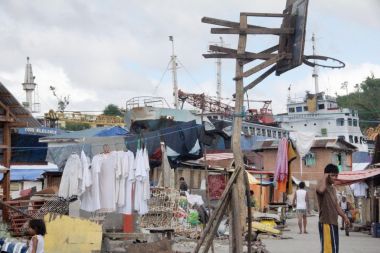'Long road to recovery' in Philippines

Development agencies are still working hard in the Philippines over three months after Typhoon Haiyan tore through the country.
The Scottish Catholic International Aid Fund (SCIAF) was thanking Scots this week for giving over a million pounds in support of its recovery work.
The typhoon was the worst natural disaster in the country's history, killing more than 3,000 people and leaving a further 12 million in need of emergency aid.
Since the typhoon struck on November 8 last year, SCIAF and other aid agencies have provided emergency aid and continue to assist survivors as they rebuild their lives.
Together with its partner aid agency, Caritas Internationalis, SCIAF has provided emergency support to over half a million survivors.
Lorraine Currie, SCIAF's Head of International Programmes, said: "The overwhelming generosity of Scots has enabled SCIAF and our partners to provide life-saving aid including food and shelter to many thousands of people whose lives were devastated by Typhoon Haiyan.
"I would really like to thank everyone who has donated to our appeal. We are continuing to support survivors and help them on what will be a long road to recovery."
Fr Edwin Gariguez, Executive Secretary of Caritas Philippines-NASSA, said: "We have never faced anything of this magnitude. We greatly appreciate the support and solidarity from around the world. By working together in a co-ordinated way, we can help save lives and rebuild communities."
In addition to the aftermath of Typhoon Haiyan, SCIAF has also been responding to the Syrian refugee crisis, which has been particularly acute in Lebanon and Jordan.
SCIAF is working with partner organisations Caritas Lebanon and Caritas Jordan to help refugees as well as vulnerable Lebanese and Jordanians with food, blankets, mattresses, stoves, oil, hygiene kits, temporary shelters, medical care, schooling for young children, and help rent for the most vulnerable families.
Ms Currie said: "The humanitarian crisis that has hit Syria is now having a major impact on the region. As the number of people fleeing the terrible violence in Syria grows, neighbouring countries are struggling to provide healthcare, schooling, accommodation and work for the refugees and vulnerable members of their own communities.
"SCIAF-funded aid is helping these groups in what continues to be a desperate situation."











